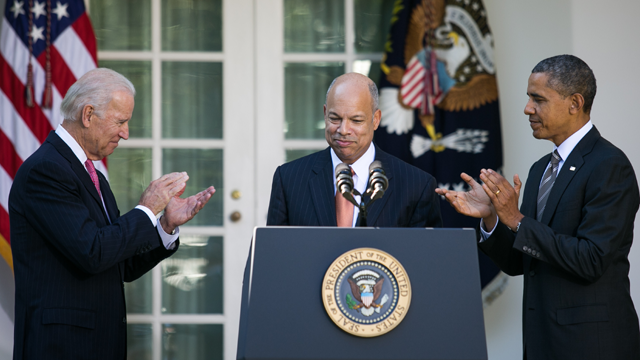
(Getty)
President Obama has tapped Jeh Johnson, 56, to replace Janet Napolitano as the Secretary of the Department of Homeland Security.
Johnson has long been an adviser to the president in matters of national security, terrorism and the law, but will he be a good choice for the American people?
Here’s what you need to know about Obama’s pick for Homeland Security secretary:
1. He Supports Mass Surveillance
Above you can hear Jeh Johnson discuss the recent revelations that the National Security Agency has been collecting the metadata from all of the United State’s cellphone users. Johnson argues that metadata, which contain all information about a phone call including phone numbers, duration, and sometimes even GPS location, come with no expectation of privacy.
In the video above, taken during the 2013 Aspen Security Forum, Johnson also claims that all of these dragnet surveillance tactics are legal and that these programs are probably “the most regulated program we have” despite numerous reports that NSA analysts have relatively free reign over collected information.
2. He Was Pivotal in Repealing ‘Don’t Ask, Don’t Tell’
Despite criticism over his stance on civil liberties, Johnson paved the way for the repeal of the military’s controversial “Don’t Ask, Don’t Tell” policy, which forbid openly gay men and women from serving in the U.S. military.
Above is a video of Johnson speaking the Oxford Union about the DADT working group and his role in the repeal of the rule.
Johnson was responsible for a study in 2010 that determined that the repeal of the rule would cause little to no harm to service members or their missions. In a story from 2010, the Defense Department quotes Johnson as saying, “with a continued and sustained commitment to the core values of leadership, professionalism and respect for all, we are convinced that the U.S. military can adjust and accommodate this change just as it has with others in history.”
3. He Oversaw the Rise of Drone Killings
As general counsel for the Department of Defense between 2009 and 2012, Johnson oversaw the rise in the use of unnamed drones and targeted killing via drone strike. Above you can hear a video of investigative journalist and drone expert Jeremy Scahill discussing the role Johnson directly played in the use of drones.
While addressing the Yale School of Law in February 2012, Johnson said of U.S. drone strikes, which have killed innocent civilians all over the Middle East:
In an armed conflict, lethal force against known, individual members of the enemy is a long-standing and long-legal practice… the rules that govern targeting do not turn on the type of weapon system used, and there is no prohibition under the law of war on the use of technologically advanced weapons systems in armed conflict, so long as they are employed in conformity with the law of war. Advanced technology can ensure both that the best intelligence is available for planning operations, and that civilian casualties are minimized in carrying out such operations.
4. He’s Tough on Whistleblowers
Johnson is and outspoken advocate for the criminal prosecution of whistleblowers like Chelsea Manning or Edward Snowden, which you can hear in the video above. When confronted about Chelsea Manning’s treatment while being held in Quantico prison, Johnson was reportedly “remarkably unforthcoming about what he discovered,” according to Harper’s.
Johnson also made headlines for his criticism of Matt Bissonnette, the Navy SEAL and author of No Easy Day, a book about the raid that killed Osama Bin Laden. Johnson penned a letter to Bissonnette in 2012 reminding him of his agreement to “never divulge” classified information. “This commitment,” he wrote, “remains in force even after you left the active duty Navy.”
The letter continues:
I write to formally advise you of your material breach and violation of your agreements, and to inform you that the department is considering pursuing against you, and all those acting in concert with you, all remedies legally available to us in light of this situation
5. He Said MLK Jr. Would Have Supported U.S. Wars in the Middle East
Johnson made headlines in 2011 for a controversial statement he made about Martin Luther King Jr. at a Pentagon commemoration of the great civil rights leader. Johnson said that had King been alive today, he would have supported the United State’s wars in Iraq and Afghanistan. He said:
I believe that if Dr. King were alive today, he would recognize that we live in a complicated world, and that our nation’s military should not and cannot lay down its arms and leave the American people vulnerable to terrorist attack
Johnson drew parallel between King’s advocacy of solidarity and compassion with what the United States is doing in the Middle East.